
Ahlem Mosteghanemi, alternatively written Ahlam Mosteghanemi is an Algerian writer who has been called "the world's best-known arabophone woman novelist".
Amuda is a town in Al Hasakah Governorate in northeastern Syria close to the Syria–Turkey border. As a result of the ongoing civil war, Amuda is currently under the civil control of the AANES and military control of the SDF and Syrian Army.
Sahar Khalifeh is a Palestinian writer. She has written eleven novels, which have been translated into English, French, Hebrew, German, Spanish, and many other languages. One of her best-known works is the novel Wild Thorns (1976). She has won numerous international prizes, including the 2006 Naguib Mahfouz literature medal for The Image, the Icon, and the Covenant.
Ella Shohat is a professor of cultural studies at New York University, where she teaches in the departments of Art & Public Policy and Middle Eastern & Islamic Studies.
Ṣāʿid al-Andalusī ; he was Abū al-Qāsim Ṣāʿid ibn Abū al-Walīd Aḥmad ibn Abd al-Raḥmān ibn Muḥammad ibn Ṣāʿid ibn ʿUthmān al-Taghlibi al-Qūrtūbi ; an Arab qadi of Toledo in Muslim Spain, who wrote on the history of science, philosophy and thought. He practised as a mathematical scientist with a special interest in astronomy, and compiled a famous biographic encyclopedia of science that quickly became popular in the empire and the Islamic East.
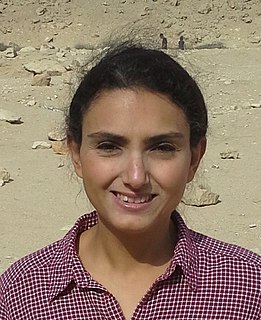
Reem Bassiouney is an Egyptian author, professor of sociolinguistics and Chair Department of Applied Linguistics at The American University in Cairo. In Addition, Bassiouney is the editor of the Routledge Series of Language and Identity. She is also the editor and creator of the journal Arabic Sociolinguistics Edinburgh. She has written several novels and a number of short stories and won the 2009 Sawiris Foundation Literary Prize for Young Writers for her novel Dr. Hanaa. While a substantial amount of her fiction has yet to be translated into English, her novel The Pistachio Seller was published by Syracuse University Press in 2009, and won the 2009 King Fahd Center for Middle East and Islamic Studies Translation of Arabic Literature Award. Bassiouney also won Naguib Mahfouz Award from Egypt's Supreme Council for Culture in the best Egyptian novel category for her best selling novel, The Mamluk Trilogy. She was also the winner of the National Prize for Excellence in Literature of the year 2022 from the Egyptian Ministry of Culture.
The Banipal Prize, whose full name is the Saif Ghobash–Banipal Prize for Arabic Literary Translation, is an annual prize awarded to a translator for the published English translation of a full-length literary work in the Arabic language. The prize was inaugurated in 2006 by the literary magazine Banipal which promotes the diffusion of contemporary Arabic literature through English translations and the Banipal Trust for Arab Literature. It is administered by the Society of Authors in the UK, and the prize money is sponsored by Omar Saif Ghobash and his family in memory of Ghobash's late father Saif Ghobash. As of 2009, the prize money amounted to £3000.
Marilyn Louise Booth is an author, scholar and translator of Arabic literature. Since 2015, she has been the Khalid bin Abdullah Al Saud Professor for the Study of the Contemporary Arab World at the University of Oxford and a Fellow of Magdalen College, Oxford.
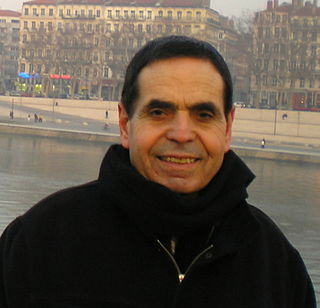
Amor Ben Salem is a Tunisian Arabic writer.
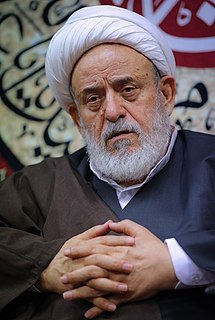
Hossein Ansarian is an Iranian Shia cleric.

Riddles are historically a significant genre of Arabic literature. The Qur’an does not contain riddles as such, though it does contain conundra. But riddles are attested in early Arabic literary culture, 'scattered in old stories attributed to the pre-Islamic bedouins, in the ḥadīth and elsewhere; and collected in chapters'. Since the nineteenth century, extensive scholarly collections have also been made of riddles in oral circulation.

al-ʿIqd al-Farīd is an anthology attempting to encompass 'all that a well-informed person had to know in order to pass in society as a cultured and refined individual', composed by Ibn ʿAbd Rabbih (860–940), an Arab writer and poet from Cordova, now in Spain.
Madrassa Shahi is an Islamic seminary in Moradabad, Uttar Pradesh. It was established in 1879 by the poor Muslims of Moradabad under the supervision of Islamic scholar, Muhammad Qasim Nanautawi, who also established the Darul Uloom Deoband. This started as Madrasatul Ghuraba, but gained recognition as Madrasa Shahi. Its first principal was Ahmad Hasan Amrohi.
Samia Mehrez is an Egyptian professor of contemporary literature, literary critic, and researcher, who was born on 1 January 1955. She is President of the Center for Translation Studies at the American University in Cairo. Mehrez has played a major role in publishing articles on translation, contemporary Arab literature, post-colonial studies and various cultural topics.
In Praise of Hatred, is the third novel by the Syrian novelist Khaled Khalifa. However, the novel was published for the first time in Dar Amisa for Publishing and Distribution, specifically in Beirut year 2006. Then, got published again by Dar Al- Adab for Publishing and Distribution in Lebanon. Moreover, has been translated into eight more languages, including English, Spanish, French, Italian and German. As it was entered into the “short” list of the international Prize for Arabic Fiction, known as the. Next, it was longlisted Foreign Fiction Prize, year 2013. Not to forget that it was chosen by American cultural site of the 100 best novels in history.

Ahmad Abd al-Ghafur Attar was a Saudi Arabian writer, journalist and poet, best known for his works about 20th-century Islamic challenges. Born in Mecca, capital city of Hejazi Hashemite Kingdom into a family of Bengali descent. He received a basic education and graduated from the Saudi Scientific Institute in 1937, took a scholarship for higher studies in Cairo University, then returned to his country and worked in some government offices before devoting himself to literature and research. Attar wrote many works about Arabic linguistic and Islamic studies, and gained fame as a Muslim apologist, Anti-communist and Zionism, he who believed in flexibility of Islamic jurisprudence for modern era. Praised by Abbas Mahmoud al-Aqqad, he was also noted for his defense of Modern Standard Arabic against colloquial or spoken Arabic. In 1960s, he established the famous Okaz newspaper and then the Kalimat al-Haqq magazine, which lasted only about eight months. He died at the age of 74 in Jeddah.
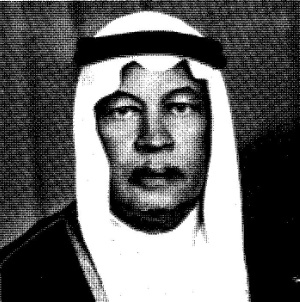
Abd al-Quddus al-Ansari was a Saudi Arabian historian, journalist and writer, born and raised in Medina under Ottoman and Hashemite rule into a Khazraji family. Employed by local government just after graduation from a local madrasah in 1928, he held several official positions from 1928 to 1954. A self-taught historian and archaeologist, he was the author of works about the history of Medina and wrote about various topics of his region, the Hejaz. In 1937, he founded “Al-Manhal” monthly magazine. He also wrote literary works like The Twins (1930), the first Hejazi-Saudi novel, but his many professional activities prevented him from writing more than one novel. He died at the age of 76 in Mecca due to an incurable disease and was buried in Al-Mu'alla Cemetery.
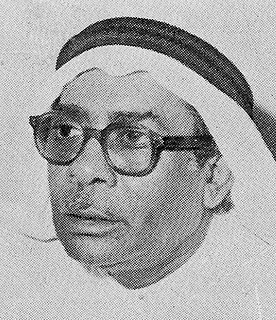
Ahmad Qandil was a Saudi Arabian poet and writer, emerged as a folk-popular poet who centralized Middle class culture in his Hejazi Arabic poetry and prose. Born in Jeddah, he studied and then taught at Al-Falah School, worked around one year as editor-in-chief of Sawt Al-Hijaz newspaper in Mecca, hold some positions in Ministry of Finance such as general manager of Hajj. After retirement from government occupations, he devoted himself to literary writing and media production in an institution he established, through which he cooperated with radio and television of Jeddah. He died at the age of 68 while recording the last episode of his program on Jeddah TV "Ramadan Lanterns", and left many collections of poetry some of which were published after his death.
Muhammad Sa'id al-Amudi was a Saudi Arabian journalist, literary critic and official. After graduation from Al-Falah school in Mecca, he worked in commerce for a while, then held several administrative positions, including: head of the Editorial Board of the General Post and Telegraph Authority and the editor-in-chief of its magazine until 1971, member of the Consultative Assembly of Saudi Arabia from 1951 to 1954, chief editor of the Muslim World League magazine and Sawt Al-Hijaz newspaper for a while. He also employed by the Ministry of Education for several committees. During his official career, he published many works in the magazines of Al-Muqtataf and Al-Hilal and was a member of the Modern Literature Association in Cairo, which was headed by the poet Ibrahim Nagi. He died after a long illness at the age of 86 in his birthplace. Al-Amudi wrote many essays, short stories, poems, and reviews. A prominent 20th-century Saudi Arabian journalist, his complete works were published in 3 volumes in 2007.
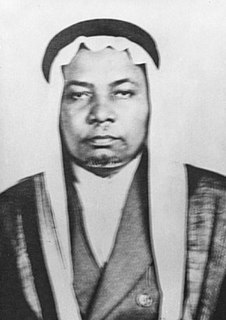
Mahmud Abd al-Khayr Al Arif commonly known as Mahmud Arif was a Saudi Arabian poet. He was born in Old Jedda, Hejaz. After studying in Kuttab for three years, he joined Al Falah School and graduated. He worked as a teacher there for seven years, then moved to government jobs and worked in various office and administrative support occupations, such as: editor, copy typist and lawyer in the Civil Endowments Department of the Sharia judiciary, director of passports and government residency and finally moved to the accounting department. He was chosen a member of the Consultative Assembly until his retirement in 1978. In 1963, appointed as editor-in-chief of Okaz newspaper for a year at the beginning of the new system for journalistic institutions in Saudi Arabia. He is one of the founding members of the Jeddah Society of Culture and Arts in 1975. As a poet, he published many collections of poetry and several other prose books.










